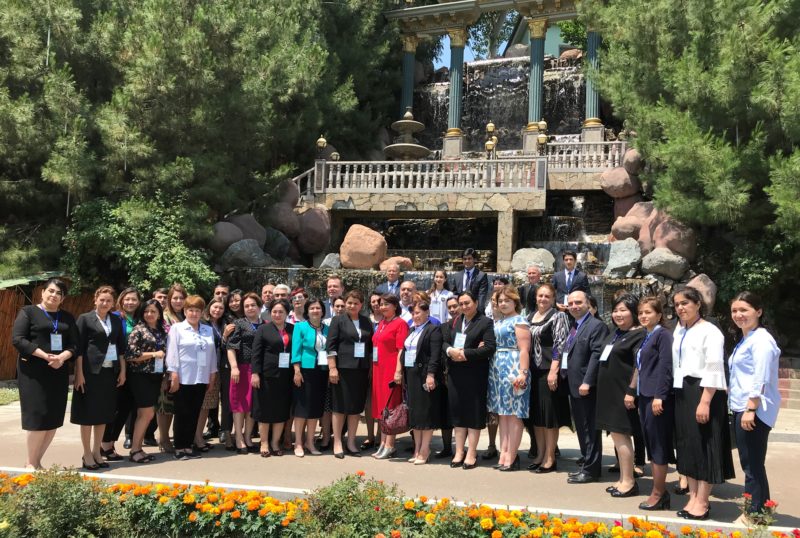On June 11-12, 2019, a subregional expert meeting on reproductive health and healthy lifestyle education for youth in Central Asia and Eastern Europe took place in Guliston (Tajikistan).
The meeting was organized by the UNESCO Almaty Cluster Office, the UNESCO Institute for Information Technologies in Education, the National Commission of the Republic of Tajikistan for UNESCO under the Ministry of Education and Science of the Republic of Tajikistan with the participation of the United Nations Population Fund (UNFPA) and the public organization Hamsol ba Hamsol (“Equal to Equal”).
Over 50 delegates from 7 countries (Tajikistan, Armenia, Belarus, Kyrgyzstan, Kazakhstan, Uzbekistan and Ukraine) attended the meeting. Among them were representatives of the Ministry of Education and Science of the Republic of Tajikistan, leaders and employees of regional and city education authorities, the Academy of Education of the Republic of Tajikistan, the Tajik State Pedagogical University, the Republican Center for Continuing Education, regional branches of the Republican Institute for the Advanced Teacher Training, representatives of public and youth organizations, as well as experts from Eastern Europe and Central Asia, specialists from UNESCO and UNFPA.
The Deputy Minister of Education and Science of the Republic of Tajikistan, Latofat Naziri, at the opening noted that it was the first event of such a high level on the topic of health education for youth in Tajikistan.

Among the opening speakers were Lutfiya Radjabova, Chairman of the Committee on Science, Culture, Education and Youth Policy of Majlisi Namoyandagon Madzhlisi Oli of the Republic of Tajikistan, Marhabo Olimi, Deputy Chairman of the Committee on Women and Family Affairs under the Government of the Republic of Tajikistan, Zulfia Burkhon, Secretary General of the National Commission of the Republic Tajikistan for UNESCO, Irina Karimova, Vice-President of the Academy of Education of the Republic of Tajikistan and Nargis Rakhimova, Acting UNFPA Executive Officer.
Tigran Epoyan, UNESCO Regional Adviser on Health Education and HIV Prevention, presented internationally recognized approaches to health education, recommended study topics, professional competences for health teachers, and gave examples of effective solutions for teacher training.

Parvina Sulaimoni, Executive Director of the youth public organization “Hamsol ba Hamsol” (“Equal to Equal”) talked about the volunteer work with young people.
Later on, conference participants shared the experience gained in the implementation of health education programs in the countries of Central Asia and Eastern Europe. They also discussed prospects for solving common problems related to the content and quality of such educational programs as well as the opportunities for a more comprehensive approach to the issues related to reproductive health, HIV prevention, and the formation of healthy interpersonal relationships in educational settings.

A great result showed the workshops “How to discuss issues related to sexual and reproductive health in the classroom and how to talk about sensitive topics” and “How to organize an interactive lesson and use multimedia materials” delivered by Irina Skorbun, Program Coordinator of the Charity Foundation “Women’s Health and Family Planning” (Ukraine) and Vitaly Nikanovich, Deputy Chairman of the Belarusian Association of UNESCO Clubs.
After having heard and discussed the reports, the experts prepared recommendations for ministries of education on improving the quality of educational programs on reproductive health and promotion of healthy lifestyle in Tajikistan and other countries of Central Asia and Eastern Europe. The text of the recommendations is available in Russian language.
